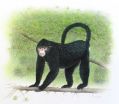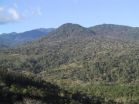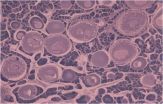(Press-News.org) An international team of primatologists have discovered a new species of monkey in Northern Myanmar (formerly Burma.) The research, published in the American Journal of Primatology, reveals how Rhinopithecus strykeri, a species of snub-nosed monkey, has an upturned nose which causes it to sneeze when it rains.
Field biologists led by Ngwe Lwin from the Myanmar Biodiversity And Nature Conservation Association and supported by an international team of primatologists from Fauna & Flora International (FFI) and the People Resources and Biodiversity Foundation, discovered the new species during the nationwide Hoolock Gibbon Status Review in early 2010. Hunters reported the presence of a monkey species with prominent lips and wide upturned nostrils.
Sightings were reported from the eastern Himalayas to the northeastern Kachin state leading the team to conduct field surveys which led to the discovery of a small population of a new species which displays characteristics unlike any other snub-nosed species previously described.
Thomas Geissmann, who is leading the taxonomic description, describes the monkey as having almost entirely blackish fur with white fur only on ear tufts, chin beard and perineal area. It also has a relatively long tail, approximately 140% of its body size.
The species has been named Rhinopithecus strykeri in honour of Jon Stryker, President and Founder of the Arcus Foundation who supported the project. However, in local dialects it is called mey nwoah, 'monkey with an upturned face.'
While the species is new to science the local people know it well and claim that it is very easy to find when it is raining because the monkeys often get rainwater in their upturned noses causing them to sneeze. To avoid getting rainwater in their noses they spend rainy days sitting with their heads tucked between their knees
Frank Momberg, FFI's Regional Programme Development Coordinator, Asia Pacific, who interviewed local hunters during the field surveys suggests that the species is limited to the Maw River area. The distribution area is believed to be 270 km (squared) with an approximate population of 260-330 individuals, meaning that it is classified as Critically Endangered by IUCN.
As this new species of snub-nosed monkey inhabits the Kachin State in northeastern Myanmar it is geographically isolated from other species by two major barriers, the Mekong and the Salween Rivers, which may explain why the species has not been discovered earlier.
According to local hunters the monkeys spend the summer months, between May and October, at higher altitudes in mixed temperate forests. In winter they descend closer to villages when snowfall makes food scarcer.
Species of snub-nosed monkeys are found in parts of China and Vietnam. Presently all species are considered endangered. Until now no species have been reported in Myanmar. However, this latest addition to the snub nosed family is already critically endangered due to increasing hunting pressure resulting from the building of logging roads by Chinese companies beginning to invade the previously isolated distribution area of this newly discovered monkey.
Mark Rose, Chief Executive of Fauna & Flora International said, "We are committed to taking immediate conservation action to safeguard the survival of this important new species together with our partners and local communities in Myanmar."
INFORMATION:
New snub-nosed monkey discovered in Northern Myanmar
The new Rhinopithecus strykeri species 'sneezes in the rain'
2010-10-27
ELSE PRESS RELEASES FROM THIS DATE:
Following lifestyle tips could prevent almost a quarter of bowel cancer cases
2010-10-27
Almost a quarter of colorectal (bowel) cancer cases could be prevented if people followed healthy lifestyle advice in five areas including diet and exercise, says a new study published on bmj.com today.
Researchers from Denmark found that following recommendations on physical activity, waist circumference, smoking, alcohol and diet could reduce the risk of developing bowel cancer considerably – by 23%.
Bowel cancer is the third most common cancer in the UK where more than 38,600 people are diagnosed with the condition every year. It is the second most common cause of ...
Year-long opiate substitution for drug misusers has 85 percent chance of cutting deaths
2010-10-27
Giving people opiate substitution treatment to help with their drug addiction can lead to a 85% plus chance of reducing mortality, according to a new study published on bmj.com today.
Researchers from Bristol and London found that the length of time people had opiate substitution treatment (OST) for had a large impact on its success and the likelihood of death.
Opiate users have a high risk of death, often from overdose.
OST, mostly methadone and buprenorphine, is central to prevention of drug related mortality and often delivered in primary care settings. Over the ...
Continuing biodiversity loss predicted but could be slowed
2010-10-27
A new analysis of several major global studies of future species shifts and losses foresees inevitable continuing decline of biodiversity during the 21st century but offers new hope that it could be slowed if emerging policy choices are pursued.
Led by experts Henrique Miguel Pereira and Paul Leadley, the 23-member scientific team from nine countries, under the auspices of DIVERSITAS, UNEP-WCMC and the secretariat of the CBD compared results from five recent global environmental assessments and a wide range of peer-reviewed literature examining likely future changes in ...
Extinction threat growing for vertebrates, researchers report in Science
2010-10-27
Increasing numbers of birds, mammals and amphibians have moved closer to extinction in the last several decades—but not as far as they would have if no conservation measures at all had been enacted, researchers report.
Their study is being published online by the journal Science, at the Science Express Web site, at 6:30 p.m., U.S. Eastern Time, Tuesday, 26 October. Science is the journal of AAAS, the nonprofit science society.
To assess the status of the world's vertebrates, a large, international research team lead by Michael Hoffmann of the International Union for ...
Scented consumer products shown to emit many unlisted chemicals
2010-10-27
The sweet smell of fresh laundry may contain a sour note. Widely used fragranced products – including those that claim to be "green" – give off many chemicals that are not listed on the label, including some that are classified as toxic.
A study led by the University of Washington discovered that 25 commonly used scented products emit an average of 17 chemicals each. Of the 133 different chemicals detected, nearly a quarter are classified as toxic or hazardous under at least one federal law. Only one emitted compound was listed on a product label, and only two were publicly ...
New insight into links between obesity and activity in the brain
2010-10-27
Scientists have revealed that an anti-obesity drug changes the way the brain responds to appetising, high-calorie foods in obese individuals. This insight may aid the development of new anti-obesity drugs which reduce the activity in the regions of the brain stimulated by the sight of tasty foods.
Researchers at the University of Cambridge discovered that the anti-obesity drug sibutramine reduced brain responses in two regions of the brain, the hypothalamus and the amygdala, both of which are known to be important in appetite control and eating behaviour. Their findings ...
Scrambling for climate change solutions
2010-10-27
The food industry generates a lot of waste products, but one of these, eggshells, could help combat climate change, according to research published in the International Journal of Global Warming this month.
Basab Chaudhuri of the University of Calcutta and colleagues have demonstrated that the membrane that lines an eggshell can absorb almost seven times its own weight of the greenhouse gas carbon dioxide from the atmosphere. The carbon dioxide thus trapped could be stored in this form until energy-effective methods of using the gas could be found that would not compound ...
Study suggests a third of shark and ray species are threatened
2010-10-27
Dr. Jack Musick, emeritus professor at the Virginia Institute of Marine Science, has overseen a global study suggesting that 33 percent of shark, skate, and ray species are threatened with extinction.
The work is part of a major new study of vertebrates by the International Union for Conservation of Nature (IUCN), the world's oldest and largest environmental network. The IUCN study shows that conservation actions have benefitted a few species of vertebrates around the world during the last few decades, but are too few and far between to slow an overall rapid increase ...
Current loss tracked down by magnetic fingerprint
2010-10-27
Scientists have been working on organic solar cells for about a decade. Their manufacture is environmentally friendly and they can be applied to all kinds of materials, such as plastic film, for instance. The trouble is, they only yield a fifth of the electrical energy that silicon solar cells do, with most of the electrical current trickling away into the material instead.
Scientists at Helmholtz-Zentrum Berlin (HZB) have developed a method that uses the magnetic fingerprint of the charge-carrying particles to reveal exactly how electricity is being lost. They did so ...
Research proves 'gender-bending' chemicals affect reproduction
2010-10-27
New research has provided the first evidence that 'gender bending' chemicals which find their way from human products into rivers and oceans can have a significant impact on the ability of fish to breed in UK Rivers.
The findings from the four year study, led by the universities of Exeter and Brunel, has important implications for understanding the impacts of these chemicals on ecosystem health and possibly on humans.
Endocrine disrupting chemicals (EDCs) disrupt the ways that hormones work in the bodies of vertebrates (animals with backbones), including humans.
They ...
LAST 30 PRESS RELEASES:
Kidney cancer study finds belzutifan plus pembrolizumab post-surgery helps patients at high risk for relapse stay cancer-free longer
Alkali cation effects in electrochemical carbon dioxide reduction
Test platforms for charging wireless cars now fit on a bench
$3 million NIH grant funds national study of Medicare Advantage’s benefit expansion into social supports
Amplified Sciences achieves CAP accreditation for cutting-edge diagnostic lab
Fred Hutch announces 12 recipients of the annual Harold M. Weintraub Graduate Student Award
Native forest litter helps rebuild soil life in post-mining landscapes
Mountain soils in arid regions may emit more greenhouse gas as climate shifts, new study finds
Pairing biochar with other soil amendments could unlock stronger gains in soil health
Why do we get a skip in our step when we’re happy? Thank dopamine
UC Irvine scientists uncover cellular mechanism behind muscle repair
Platform to map living brain noninvasively takes next big step
Stress-testing the Cascadia Subduction Zone reveals variability that could impact how earthquakes spread
We may be underestimating the true carbon cost of northern wildfires
Blood test predicts which bladder cancer patients may safely skip surgery
Kennesaw State's Vijay Anand honored as National Academy of Inventors Senior Member
Recovery from whaling reveals the role of age in Humpback reproduction
Can the canny tick help prevent disease like MS and cancer?
Newcomer children show lower rates of emergency department use for non‑urgent conditions, study finds
Cognitive and neuropsychiatric function in former American football players
From trash to climate tech: rubber gloves find new life as carbon capturers materials
A step towards needed treatments for hantaviruses in new molecular map
Boys are more motivated, while girls are more compassionate?
Study identifies opposing roles for IL6 and IL6R in long-term mortality
AI accurately spots medical disorder from privacy-conscious hand images
Transient Pauli blocking for broadband ultrafast optical switching
Political polarization can spur CO2 emissions, stymie climate action
Researchers develop new strategy for improving inverted perovskite solar cells
Yes! The role of YAP and CTGF as potential therapeutic targets for preventing severe liver disease
Pancreatic cancer may begin hiding from the immune system earlier than we thought
[Press-News.org] New snub-nosed monkey discovered in Northern MyanmarThe new Rhinopithecus strykeri species 'sneezes in the rain'


